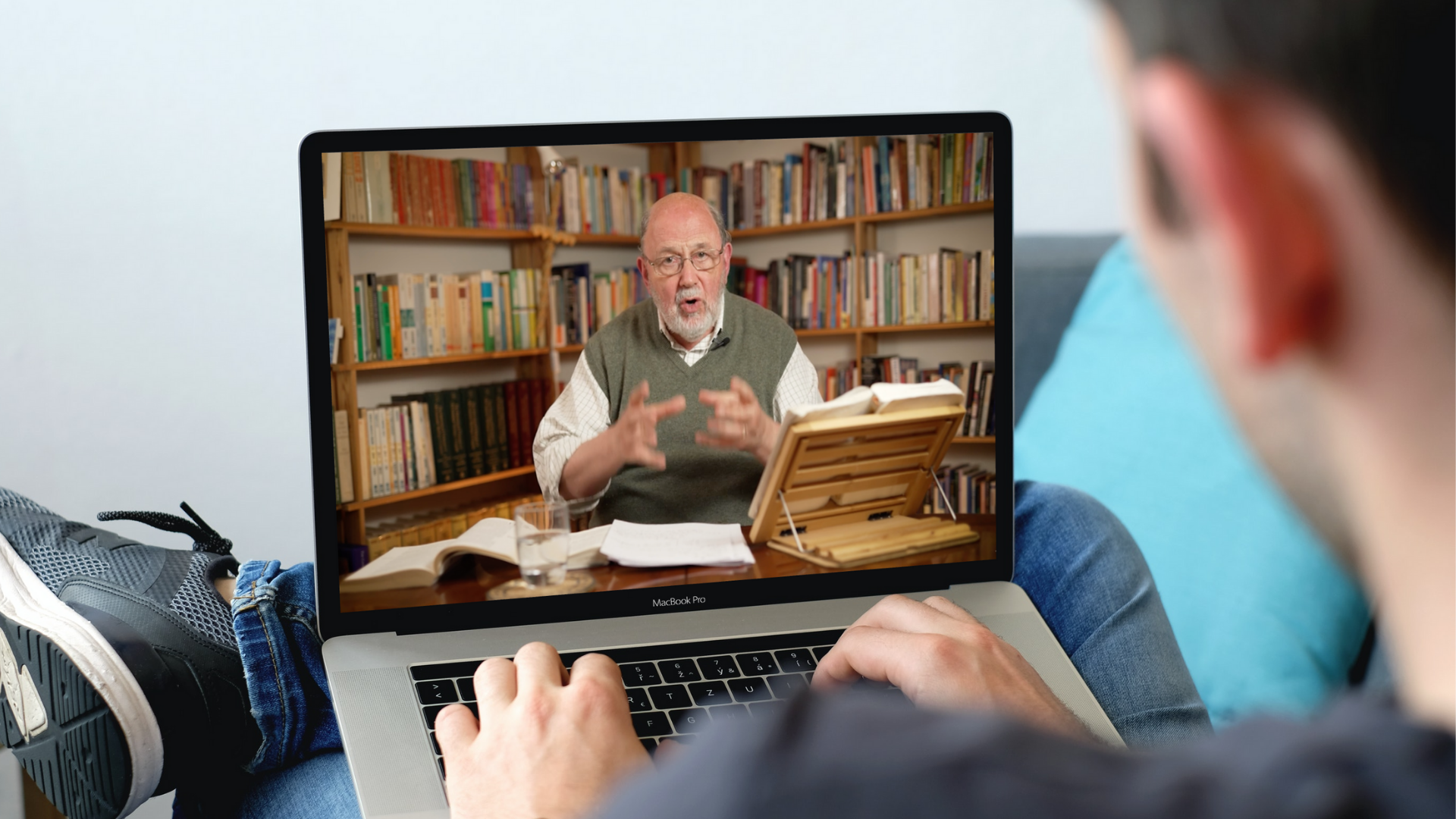Studying in Community
My wife and I live on the property of a long-time family friend, helping them care for their farm animals. The other day, I was feeding the animals and talking to this friend who, mind you, I’ve known for over a decade. I’ve watched her kids grow up, counselled them during Summer Bible Camps and Youth Group. I’ve lived at her property for multiple years. I think I know them fairly well. But I learned something new during this conversation.
For far longer than I’m proud to admit, she had no idea I worked for N.T. Wright Online, and I had no idea she was a student of N.T. Wright Online. My friend told me that they own and have read most of Prof. Wright’s books, including the academic ones (if you know, you know). She uses Prof. Wright’s material when she teaches in Bible Study Fellowship. And she has a number of our courses.
As we got talking, she told me, ‘I’ve had this one course for years, but I’m just not sure how to get started and make the most of it, especially since I want to use it in teaching others.’
That conversation got me thinking! Personally, I tend to isolate myself while studying, but I know that isn’t necessarily common. So, in the spirit of and consideration for my friend, I want to provide some tips for making the most of an N.T. Wright Online course, as well as a simple outline for how to supplement the course material, whether you’re planning to learn on your own, with a friend, or in a small group setting. We hope to continue to make new and existing courses more amenable to the wide variety of learning contexts and styles which we know our students inhabit.
Tips & Tricks
Schedule a ‘class’ time: Often, the biggest obstacle to doing anything is simply starting. Even then, it can be a hassle to find the time, or motivate yourself to ‘work’ when free time arrives. Making an appointment, just as you would for work, the doctor, or a date, is a great way to stay accountable in your learning. Seriously. Pick an hour or two once a week. Write it down on your calendar. Tell your family that you have a meeting or an appointment. Get out of the house if you need to. Whatever it takes to get started and get over that initial hurdle.
Find a buddy: Not only is this another great way to stay accountable, but learning in community is a proven tactic for better knowledge retention. Plus, it’s fun! What’s better than catching up with a friend over coffee? Catching up with a friend and the Bible over coffee!
Set your intention: You know the saying, you get out what you put in. So what do you want to get out of this study? Are you doing this to learn some new concepts, to grow closer to God, to fulfil education requirements? If you’re studying with a friend, you may have very different expectations going into your study, so it’s a good idea to name those ahead of time, and set some realistic goals that you can agree on. Even if you’re not a goal-setter. Thinking, or better yet praying, about what you hope to accomplish during your time studying can be of great value.
Grab a notebook: Our course platform, Udemy, has a note-taking function, but I’m a bit old fashioned and still find pen and paper the best way to take notes. There’s nothing worse than hearing a great quote or thinking of a profound question and not being able to remember it later.
Have a Bible open in front of you: Speaking of the Bible, keep it open! Relevant scripture readings are provided in the course, but Prof. Wright has a habit of jumping around and drawing connections between disparate verses. So it’s a good idea to have a Bible handy so you can pause the lecture and read the verses you’re unfamiliar with. We don’t expect you to have the whole Bible memorised, and even if you do (show off…), it’s always a good idea to check back in with God’s words. We recommend a good study Bible like the Harper Collins NRSV.
Get a good commentary: It isn’t always necessary, but if you’re working on one of our studies of a single book of the Bible, commentaries can be immensely helpful. Whether you find a commentary dedicated to that book, or if it’s just a Bible with great annotations, commentaries provide necessary context and additional voices to the discussion at hand.
Slow Down!: When I taught undergraduate English, this was my number one rule for my students. I knew they had a million assignments, two jobs, and ‘reputation-defining parties’ to attend. But I always preferred quality work turned in a few days late to rushed, sloppy work that didn’t result in actual learning. The goal is to learn, and everyone learns on their own time. So take your time! Rewatch lectures. Ponder the questions over dinner. Let the concepts percolate in your head for a day, a week, a month. I promise I won’t mark you down.
Learning Like a Pro
Here’s a basic outline of how you can use our courses for a robust learning experience. In this model, the course is split up into a number of weeks (you choose, but we recommend two to three lectures a week), with a predetermined order of activities to complete each week. Keep scrolling for an example of how this could work in one of our favourite courses.
Read the relevant passages for that week’s lectures
Watch or Listen to the video lectures.
If in a group, watch on your own before meeting, or watch together.
Reflect or Journal about the discussion questions provided after the lectures.
If in a group, share your answers with each other.
Discuss: What was your biggest takeaway? Who will you share these ideas with this week?
At the End of the Course – Next Steps
Question: What questions do you still have?
Keep Learning: What research can you do, who can you talk to, or what resources do you know of that will help you think more about those topics?
Practice: What is one action you want to implement as a part of your everyday life as a result of what you’ve learned?
Remember: What are one or two major concept(s) you want to remember for years to come?
A Sample Plan
Of course, the above model can be used on any course you like, but we’ve designed a sample outline for one of our favourite courses, Paul and His Letter to the Romans: Part One. Remember to follow the basic outline above to engage with the material after watching the lectures.
As a bonus, we’ve written all-new reflection questions for each lecture(!), and put all three of our Romans courses on sale for the month of June 2022.
Week One: Skim the book of Romans. We’ll read the rest as we go along, so don’t get bogged down.
Watch Introduction + Sessions 1 & 2
Week Two: Read Romans 1:1-17
Watch Sessions 3, 4, & 5
Week Three: Read Romans 1:18-2:end
Watch Sessions 6, 7, & 8
Week Four: Read Romans 3
Watch Sessions 9, 10
Week Five: Revisit Romans 3
Watch Sessions 11, 12, & 13
Week Six: Read Romans 4
Watch Sessions 14 & 15
Week Seven: Read Romans 5
Watch Sessions 16, 17, & 18
Week Eight – Review and celebrate what you’ve learned!
Follow the ‘Next Steps’ described in the outline above.
Want to keep learning? Here are a few of our favourite recent books about Romans:
Romans Disarmed: Resisting Empire, Demanding Justice by Sylvia C. Keesmaat & Brian J Walsh
Conformed to the Image of His Son: Reconsidering Paul’s Theology of Glory in Romans by Hailey Goranson Jacob
Reading Romans Backwards by Scott McKnight
Reading Romans in Pompeii by Peter Oakes
Romans: A Theological and Pastoral Commentary by Michael J. Gorman
Ready to kick start your study of Paul’s Letter to the Romans? Part One is on sale now!
CLICK HERE to enrol for US$59.99.
Already in the course? Grab a friend and jump back in! Remember, N.T. Wright Online courses make a great gift!
Ryan Liguori
Latest posts by Ryan Liguori (see all)
- Why Don’t the Gospels Match? - September 29, 2022
- How to Make the Most of an N.T. Wright Online Course - June 7, 2022
- Three Key Concepts from Prof. Wright’s New Course An Advanced Study in Galatians - May 19, 2022







